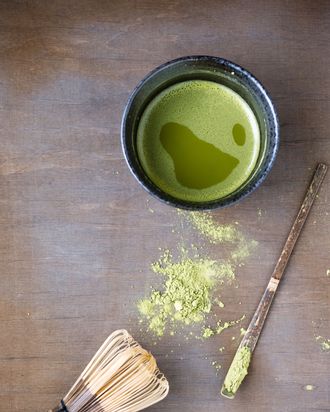
Here’s the newest juice being carried all over New York and Instagrammed by Gwyneth Paltrow: matcha tea. Like pressed green juice, drinking (or, at least documenting) it denotes that you value wellness and health, and can spend up to $10 on a beverage. Carrying around this green drink indicates you’re on this new digestible trend while everyone else is still on basic pressed kale. But like many “new” things in the wellness world, matcha isn’t exactly new — it’s a new-old thing, discovered by Chinese monks in early 2500 B.C.E. The traditional process of making matcha includes whisking hot water and matcha powder until the mixture becomes frothy.
More recently in New York, matcha has become widely available. Matcha hubs like MatchaBar and Chalait in the West Village have opened, selling Instagram-worthy perfectly swirly matcha lattes on marble countertops. Juice Press will soon sell matcha, with a breakfast matcha parfait to launch in the next few weeks. Head chef Daniel Sage of Juice Press says that the matcha addition was created in response to customer demand and its “incredible nutritional content.” Like wine, matcha varies in price according to quality. The youngest, most delicate green-tea leaves are the highest grade and most expensive, while those that are lower and bigger are less expensive. To find out why you should consider adding matcha to your diet from a beauty and health perspective, the Cut spoke to several nutritionists, doctors, and matcha experts.
How is it different from green tea? They’re both green. It’s better. Although they both come from the same plant, matcha is the purest form of green tea. “With matcha, you are consuming 100 percent of the leaf, rather than just what’s steeped outside into the water, as you would with green tea,” Jessica Lloyd and David Mandelbaum of matcha company Panatea explain.
Can it make you smarter and more focused? Like the ASMR of beverages, matcha has a calming effect. According to nutritionist Cynthia Sass, it contains an amino acid called L-theanine, which relaxes you without making you sleepy. “L-theanine blocks the binding of L-glutamic acid to glutamate receptors in the brain, which makes the brain less excited,” Sass explains. Of its focusing effects, nutritionist Dana James adds that L-theanine switches off glutamate, allowing there to be more gamma amino butyric acid (GABA), which inhibits excitatory neurotransmitters like dopamine and serotonin.
Is it better than coffee? Sort of. Unlike coffee, matcha delivers caffeine into the bloodstream in a much more measured and even way, so you don’t get jitters. It also doesn’t produce cortisol, the stress hormone frequently induced by drinking coffee. Lloyd and Mandelbaum also say that the caffeinated effects of matcha last for four to six hours, compared to coffee’s quicker boost and crash. Graham Fortgang of MatchaBar estimates there is about 80 milligrams of caffeine in a serving of matcha, with coffee being somewhere between 90 and 150.
Can it help you lose weight? Maybe. Sass explains, “There is research on green tea and weight loss, which shows that the combination of catechins and caffeine is tied to reduced BMI, body weight, and waist measurement.” Matcha contains increased amounts of both compared to green tea, so, Sass says, “there may be some weight loss benefits.” Dr. Gina Sam, M.D., M.P.H., and director of the Gastrointestinal Motility Center at the Mount Sinai Hospital, tentatively agrees: “There may be some evidence that this agent will help with losing weight.” Looking to lose a few pounds? Now you have another reason to order matcha Kit Kats.
Is matcha good for you? It contains a lot of antioxidants, which have anti-inflammatory properties. Sass explains that anti-inflammation is good because it is a “known trigger of premature aging, and is tied to numerous diseases, including heart disease, type 2 diabetes, and cancer.”
So I should just start drinking lots of matcha, right? Yes, but not too much. According to Sass, lead contamination can be a “real concern” with matcha. Dr. Sam explains, “The issue with natural substances is that they are not FDA approved or researched. If you overconsume any natural substance, they can have harmful effects, such as liver and lead poisoning. Drinking too much [matcha] can cause potential danger.” Sass’s advice is to purchase good brands, don’t give matcha to children, and to limit consumption to one cup a day.
Overall, you can feel fancy and healthily smug about drinking matcha. As a final word, Dr. Sam says this: “I would suggest using it in moderation, but I am not suggesting that it is curing weight loss or obesity. As a supplement in green tea, it is fine. It’s been around for years. It seems like it is safe.”





